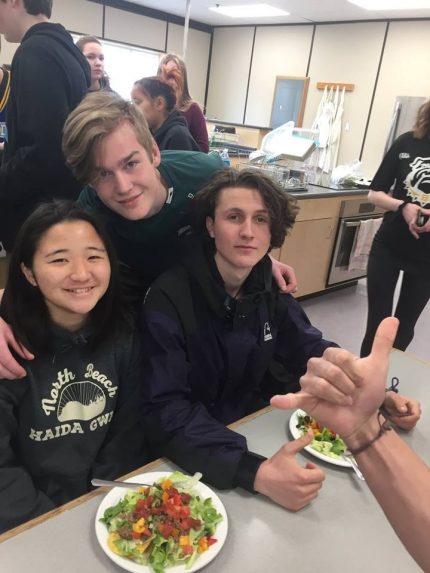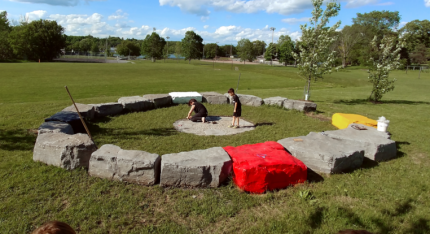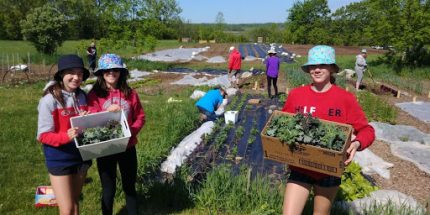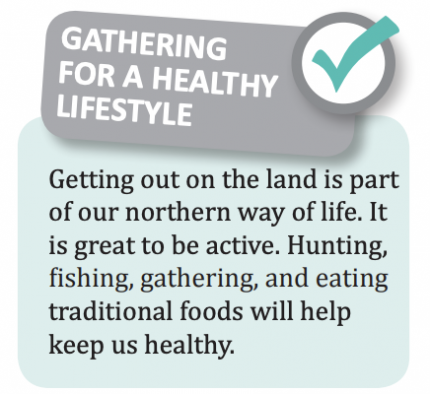National Indigenous History Month: Farm to School Stories and Resources
Posted: June 11, 2021
Categories: Edible Education Network / Good Food Ideas for Kids / News from Sustain Members / School Food News / Schools
The month of June is National Indigenous History Month, a time to honour the history, heritage and diversity of Indigenous peoples in Canada.
The Ontario Edible Education Network would like to share Farm to Cafeteria Canada (F2CC)’s recent blog post that highlights some inspiring stories of school communities who are embracing Indigenous foodways, as well as some valuable resources.
Stories from the Field
The following two stories share how F2CC’s Farm to School: Canada Digs In! grantee schools are shifting their own school food systems:
 In Masset, British Columbia, Gudangaay Tlaats’gaa Naay Secondary School (GTNS)’s salad bar story shares how their school food culture changed dramatically thanks to a Learning Circle and a supportive principal. The school, located on the north end of Haida Gwaii, moved from “grab and go” hallway meals to home-cooked hot lunches 5 days a week that include local and traditional foods. Students are also preparing soil, planting seeds, weeding gardens, and harvesting food. A science teacher has facilitated a number of land-based field trips, which include deer hunting, fishing, clam digging and harvesting on the land. Back in 2016, GTNS shared with us: “Over the past 7 years there has been an island wide movement to get more local and traditional foods onto the plates of students. As the hot meals move towards more local seafood, venison roasts, local veggies; students are also leaving the classroom and getting into the garden, getting out to the land to harvest food.” Read more from GTNS here.
In Masset, British Columbia, Gudangaay Tlaats’gaa Naay Secondary School (GTNS)’s salad bar story shares how their school food culture changed dramatically thanks to a Learning Circle and a supportive principal. The school, located on the north end of Haida Gwaii, moved from “grab and go” hallway meals to home-cooked hot lunches 5 days a week that include local and traditional foods. Students are also preparing soil, planting seeds, weeding gardens, and harvesting food. A science teacher has facilitated a number of land-based field trips, which include deer hunting, fishing, clam digging and harvesting on the land. Back in 2016, GTNS shared with us: “Over the past 7 years there has been an island wide movement to get more local and traditional foods onto the plates of students. As the hot meals move towards more local seafood, venison roasts, local veggies; students are also leaving the classroom and getting into the garden, getting out to the land to harvest food.” Read more from GTNS here.
The video below showcases the Haida Gwaii Learning Circle and how the community has beautifully come together to reconnect young people to their land and food:
Local Foods to School: Reconnecting the Children of Haida Gwaii to Their Food and Their Land from SPARC BC on Vimeo.

At Loughborough Public School in Sydenham, Ontario, students are learning how to grow and prepare their own food, and are immersed in projects that bring them closer to the teachings of Anishinaabe and Haudenosaunee culture.
A teacher at Loughborough school shares: “Experiential education like this means reconnecting with nature through the traditional teachings of Anishinaabe and Haudenosaunee culture which tell us that honouring the land is a way to experience the mental health benefits of gratitude while living sustainably with nature.”  The school has implemented many initiatives that teach sustainability, Indigenous culture and food literacy. Loughborough has been identified as a Legacy School by the Downie Wenjak Foundation for their work towards Truth and Reconciliation. Learn more about Loughborough here.
The school has implemented many initiatives that teach sustainability, Indigenous culture and food literacy. Loughborough has been identified as a Legacy School by the Downie Wenjak Foundation for their work towards Truth and Reconciliation. Learn more about Loughborough here.
We encourage you to find more inspiration on the Indigenous Food Ways section of the F2CC blog, and explore the resources below.
.
Resources we can all learn from
- The Indigenous Food Circle aims to better understand and promote Indigenous perspectives and experiences around food. Through their UnderstansingOurFoodSystems.com project with the Thunder Bay District Health Unit, they have shared many resources, such as the Thirteen Moon Traditional Harvesting Map, a guide to seasonal cycles and community practices.
- The First Nations Health Authority in British Columbia has published an informative set of facts sheets on traditional foods, their nutritional value, history of use, and traditional harvesting methods.
- The Wild and Country Food In Newfoundland and Labrador Database is designed to help individuals, communities, academics and others better understand the food that’s all around us.

- This 28-page Traditional Food Fact Sheet Series, a collaborative effort of Ecology North and the Department of Health and Social Services, also offers tons of information on traditional foods.
- Kidsnacks in the US has developed A Traditional Snack Guide Based on Ojibwe Foods that offers some great recipes and discussions.
- This Cultivating Change webinar from Food Secure Canada shares the recording of their Lessons from Indigenous-led School Food Programs webinar.
- The Earth to Tables Legacies project is a multimedia educational package focused on Indigenous-settler relations, food justice, food sovereignty and anti-racism in the food movement. The website offers a plethora of resources including videos and facilitator’s guides supplemented by insightful commentary from activists & academics across Turtle Island. Read more about Earth to Tables here.
- Red Rising Education out of Winnipeg supports educators to integrate Indigenous pedagogy and ways of knowing into their learning spaces. Check out their “What is Indigenous Education?” video and other resources.
- And the Indigenous Communities tab of the F2CC resource centre shares other local food to school resources and initiatives; for instance, the BC Farm to School Guide speaks about incorporating traditional foods into school menus.
If you have a resource that you’d like to share with F2CC, please email info@farmtocafeteriacanada.ca.
